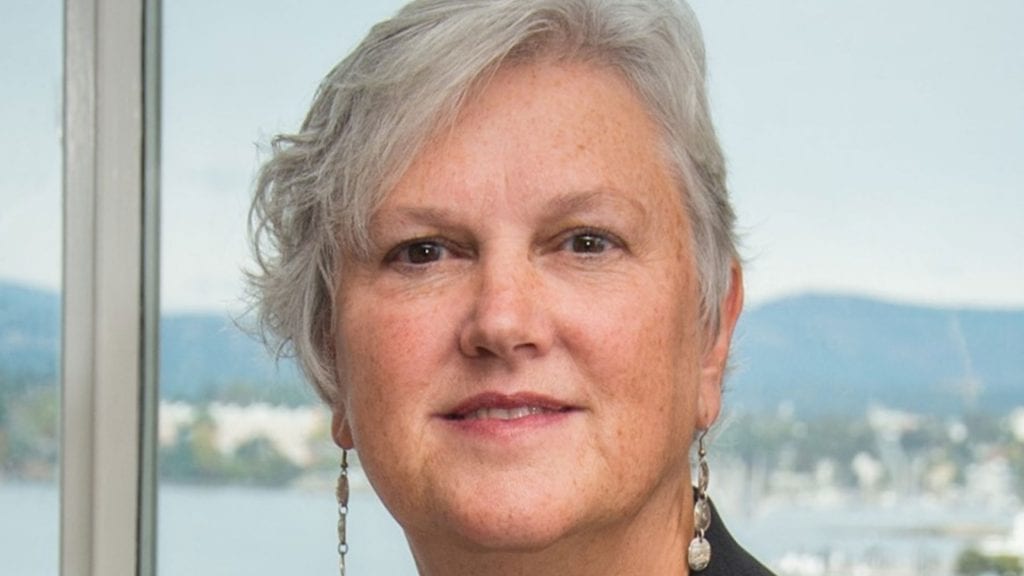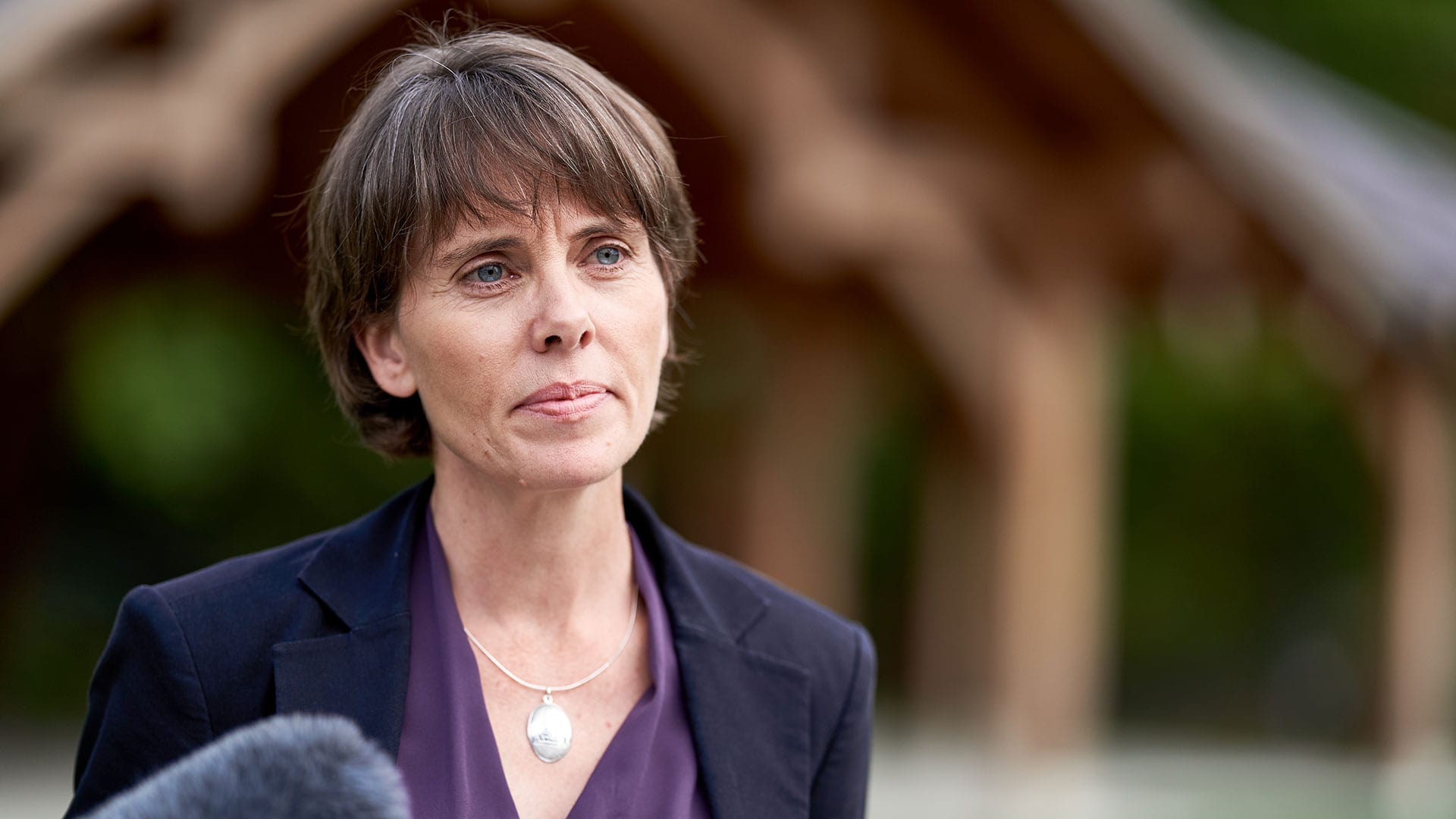
RCY Jennifer Charlesworth lives in the traditional territories of the Lekwungen and W̱SÁNEĆ peoples. Photo courtesy of the RCY’s office.
The B.C. government should apologize to families who were the subjects of birth alerts, says the province’s Representative for Children and Youth (RCY) Jennifer Charlesworth.
“We believe that these families are due a public apology from the provincial government, which should acknowledge how wrong and harmful this practice was,” the RCY said in a statement released Jan. 14 in response to IndigiNews’ ongoing investigation into the legality of birth alerts.
“We also believe that, if information regarding previous birth alerts remains on the current personal health records of any women, such information should be removed.”
A “birth alert” or “hospital alert” is when a social worker flags an expectant parent to hospital staff — without their consent — because they feel the parent may put their newborn at risk. The hospital then notifies the social worker when the baby is born.
“In some cases, these alerts contributed to separating babies from mothers and families at what are critical bonding times,” reads the RCY’s statement.
According to government records obtained by IndigiNews, birth alerts led to babies being apprehended approximately 28 per cent of the time in B.C. In 2018, 58 per cent of the parents who were subject to birth alerts in B.C. were Indigenous.
The RCY provides independent oversight for the province’s child welfare system. Charlesworth has served as B.C.’s RCY since August 2018, and her team is responsible for monitoring, investigating, and advocating for children and youth in or from government care.
She says she is “very concerned about the content” of documents obtained and published by IndigiNews. These records show that months before B.C.’s Ministry of Children and Family Development (MCFD) formally put a stop to birth alerts on Sept. 16, 2019, the ministry was advised by the province’s Ministry of the Attorney General that birth alerts are “illegal and unconstitutional.”
“For years and years and years, I’ve been opposed to the notion of birth alerts,” says Charlesworth. “In starting in this role, I felt it was really important that we continue to push against the use of birth alerts, so we were certainly heartened when [they were stopped.]”
Read More:
B.C. ministry warned birth alerts ‘illegal and unconstitutional’ months before banning them
Several Canadian provinces still issue birth alerts, deemed ‘unconstitutional and illegal’ in B.C.
In reviewing the records obtained by IndigiNews, Charlesworth says what stood out to her was that months before then-minister Katrine Conroy officially put a stop to birth alerts, there were discussions happening within MCFD about privacy breach concerns.
“Even though the practice of birth alerts was discontinued, I want to know: what other stones do we need to turn over to make sure that things are made right?” says Charlesworth. “I want to understand more about what happened.”
“We’ve had a lot of discussions, both with the privacy commissioner and with the Ministry of Children and Family Development, about what our next steps are.”
She says her team is also reaching out to the Ministry of Health and the health authorities to ask what is written on a patient’s file following a birth alert. This is important to understand because notes on a person’s record can create “the condition for the possibility of ongoing bias or discrimination,” as documented in a recent report on anti-Indigenous racism and discrimination in B.C.’s health care system, Charlesworth says.
“Given what we now understand, that would be a breach of privacy, and it would need to be addressed and removed.”
‘Public apology is in order’
Birth alerts involve the sharing of a parent’s personal information between social workers and health care workers without the parent’s consent. As previously reported, this constitutes a breach of privacy, according to Michael McEvoy, B.C.’s Information and Privacy Commissioner.
“Our office has looked at this issue, and it is our view that the practice of ‘birth alerts’ is not authorized by FIPPA [B.C.’s Freedom of Information and Protection of Privacy Act],” a spokesperson for the commissioner told IndigiNews via email.
“I certainly think that, at a minimum, a public apology is in order,” says Charlesworth.
IndigiNews asked MCFD Minister Mitzi Dean whether she plans to issue an apology to parents and families impacted by these alerts.
“Any discussions around a formal apology need to be held first with Indigenous communities and developed in collaboration with those communities,” said a ministry spokesperson via email.
“The Ministry is engaging with Indigenous leadership on these issues,” they added.
As to the question of reparations for families, Charlesworth says that’s outside of her mandate. But she believes each family’s situation should be considered on a case-by-case basis.
Some families may not know that social workers shared their personal information with hospital workers in the form of a birth alert. In an email to IndigiNews, MCFD said it hasn’t let parents know that it breached their privacy by issuing a birth alert about them because it “didn’t want to retraumatize affected families by providing notifications of past birth alerts.”
“I think that’s a relatively weak response,” says Karin Kirkpatrick, Liberal MLA for West Vancouver-Capilano, and the official opposition critic for children, family development and childcare in B.C.
“I think we have privacy legislation that would dictate otherwise,” she says. “As with a privacy breach of any other kind, people deserve to be informed of it in a timely manner.”
Kirkpatrick says she supports the RCY’s call for a public apology.
So does Sonia Furstenau, leader of B.C.’s Green Party and MLA for Cowichan Valley.
“That is a starting point, not an ending point,” Furstenau says. “And then there is an enormous amount of work and change that should flow from that apology.”
“I just cannot think of something more traumatizing for a mother and a baby then to be separated — unwillingly separated — within hours or days or weeks of birth,” she says.

And we have to “recognize the ways in which this is a systemically racist system,” Furstenau adds.
“The contrast between a white woman of privilege going into hospital with zero expectation that there’s any chance that I’m not leaving with my baby after I give birth … Indigenous women do not have that privilege.”
As for MCFD’s stated reluctance to notify families who were subjected to birth alerts for fear they may be retraumatized, Furstenau says, “the damage has been done.”
MCFD needs to “reconnect with these families, assess what the extent of the trauma was because of that action and then work to repair it,” she says.
“That’s the work that they need to do.”
Next steps for the RCY
The RCY has committed to doing a review, which could result in a public report or policy recommendations for the government. As an oversight body, Charlesworth says her office has a mandate to investigate any trend, practice or policy that may be harmful to or not supportive of children, youth and families. She says their review will likely take a few months, depending on the volume of information and how easy it is to access.
“It’s going to be quite tricky to determine how many birth alerts were issued and for whom,” she says. “It’s not a field that’s collected.”
The RCY will need to track down that information “in a number of different ways,” she adds.
Charlesworth says she appreciates the opportunity to review MCFD’s records and the process that preceded the ministry’s decision to ban birth alerts. And she says B.C.’s privacy commissioner has offered to provide advice and counsel as they review what happened.
“Anything that calls the system to take a closer look at itself and its practices and where it might have caused harm is a good thing,” she says.
At the same time, she adds it’s important not to lose sight of the bigger picture — the drivers pushing people into the child welfare system such as “poverty, domestic violence, mental health … [and] substance use concerns within the family [and] multiple moves.”
“This is generations old. All the crap that we’re seeing down in the States? That’s absolutely indicative of white supremacy and the kind of big power dynamics that have resulted in the kinds of things that we’re seeing. So, yes, kids are at risk. And, yes, kids are unsafe. And we have to intervene. But we also simultaneously have to be saying, so what’s given rise to these vulnerabilities in the first place?” she says.
“We have to take at poverty, we have to take a look at housing, we have to look at social attitudes … I don’t want to just keep nibbling at the edges of our system. Okay, well, we don’t have birth alerts — are we done? No, we’re not done. We’re not done at all.”
This is part of a series about the legality of #BirthAlerts and the implications for families. If you have a story to share about your own lived experience, email [email protected]










